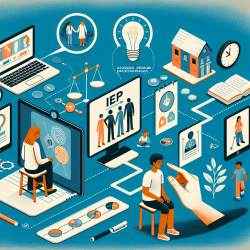Unlocking the Power of Data and Decisions in a Pandemic
In the realm of special education and online therapy, understanding the role of data, statistics, and decision-making during a pandemic is crucial. The research article "On the role of data, statistics and decisions in a pandemic" provides a comprehensive overview of how these elements can be harnessed to improve decision-making processes. This blog post explores the key findings and offers practical insights for practitioners seeking to enhance their skills and outcomes.
The Critical Role of Data and Statistics
Data collection and statistical modeling form the backbone of effective decision-making during a pandemic. The research highlights the importance of gathering accurate data and employing various modeling techniques to interpret this information. For practitioners, this means embracing data-driven approaches to assess the severity of situations and determine appropriate interventions.
Embracing Statistical Literacy
One of the key takeaways from the research is the need for statistical literacy among practitioners. Understanding the nuances of data interpretation and the limitations of statistical models is vital. Practitioners should strive to improve their statistical literacy to make informed decisions that positively impact their clients.
Effective Communication and Collaboration
The research underscores the importance of disseminating findings effectively. Practitioners should focus on clear communication of data insights to stakeholders, including clients, families, and educational institutions. Moreover, interdisciplinary collaboration is essential for successful outcomes. Working alongside data scientists, statisticians, and other experts can enhance the quality of decisions and interventions.
Practical Applications for Practitioners
- Data-Driven Decisions: Utilize data to inform therapy plans and interventions. This approach ensures that decisions are based on evidence rather than assumptions.
- Continuous Learning: Engage in ongoing education to improve statistical literacy and stay updated with the latest research and modeling techniques.
- Collaborative Efforts: Foster partnerships with experts in data analysis and statistics to enhance decision-making processes.
- Clear Communication: Develop strategies to effectively communicate data insights to clients and stakeholders, ensuring transparency and understanding.
Conclusion
Incorporating the findings from the research article into practice can significantly improve outcomes in special education and online therapy. By embracing data-driven approaches, enhancing statistical literacy, and fostering collaboration, practitioners can make informed decisions that benefit their clients. To delve deeper into the research and explore the detailed findings, we encourage you to read the original research paper On the role of data, statistics and decisions in a pandemic.










